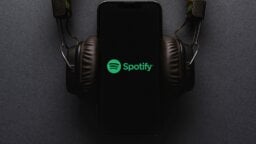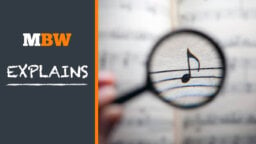What’s happened?
The music publishing community gathered in London today to celebrate songs and songwriters at the annual Ivors Awards.
This year’s event was an extra special one, with Bruce Springsteen becoming the first international songwriter in The Ivors Academy’s 80-year history to be awarded its highest honor: the Fellowship.
The Boss has now joined an elite group of songwriting legends who have received the Fellowship, including Sir Paul McCartney, Kate Bush CBE, Joan Armatrading CBE, and Sting, the 2023 recipient.
Bernie Taupin, meanwhile, known for his successful songwriting partnership with Sir Elton John, was recognized with the Ivor Novello for Outstanding Contribution to British Music.
As always, the mood in music publisher and songwriter circles in the days leading up to The Ivors was celebratory, but one unfortunate topic of discussion this week just couldn’t be avoided: the ongoing feud between US music publishers and the world’s largest subscription music streaming service, Spotify.
Their dispute stems from SPOT’s controversial decision to reclassify its Premium tiers as ‘bundles’ by combining music and audiobooks, which has resulted in Spotify paying a lower mechanical royalty rate in the US to publishers and songwriters than standalone music subscription services.
Here’s exactly what that means, how that happened, who has said what so far, and what could happen next.
The back story
To explain exactly how Spotify has been able to pull off its controversial bundle trick, we need to rewind the clock back to 2022.
In August of that year, the United States Copyright Royalty Board (CRB) accepted a (near) music industry-wide settlement to improve songwriters’ streaming royalty rates in the United States from January 1, 2023.
The settlement – known as ‘Phonorecords IV’ or ‘CRB IV’ – will see songwriters and music publishers paid a headline rate of 15.35% of a given interactive streaming service’s US revenue by 2027.
That rate is being ‘phased in’, because ‘Phonorecords IV’ covers the five-year period between 2023 and 2027:
- In 2023 (starting January 1), songwriters and music publishers were to be paid a headline rate of 15.1% of a US service’s revenue;
- in 2024, this increased to 15.2%;
- in 2025, it will increase to 15.25%;
- in 2026 it will increase to 15.3%;
- and in 2027 it will reach 15.35%.
The deal also included a number of changes to other components of the rate, including increases to the per-subscriber minimums and the “Total Content Costs (TCC)” calculations which reflect the rates that services pay to record labels.
That same 2022 legal settlement – aka Phono IV –which you can read in full here, also included a provision about how streaming services treat bundles.
More specifically, music publishers and music streaming services agreed that ‘bundle’ services in the United States are permitted to pay a lower mechanical royalty rate to publishers and songwriters than standalone music subscription services.
So Why has a provision in an agreement signed in 2022 suddenly resulted in less money for songwriters today?
In April, Spotify announced that it now considers all of its Premium plans to be ‘bundles‘.
That’s because, in October, Spotify started offering 15 hours worth of audiobooks with its Premium plans for free, in other words, ‘bundling’ access to audiobooks with its Premium services.
Alongside its decision to classify its Premium music services as bundles because of the added audiobooks element, Spotify has also been making moves to offer different types of subscriptions focused on the different types of content it offers.
For example, the company launched a $9.99 per month standalone audiobook tier in March in the US.
And on its Q1 earnings call on April 23, Spotify co-founder and CEO Daniel Ek confirmed that a new ‘music-only’ subscription tier is coming to the platform.
By announcing that all of its Premium plans are now being treated as ‘bundles‘ in the US, Spotify confirmed that the mechanical royalty rate it pays to songwriters and publishers for all of its Premium services in the US has been reduced – because of that agreement it made with music publishers about ‘bundles’ in 2022.
A Spotify spokesperson said last month: “As our industry partners are aware, changes in our product portfolio mean that we are paying out in different ways based on terms agreed to by both streaming services and publishers.
“Multiple DSPs have long paid a lower rate for bundles versus a stand-alone music subscription, and our approach is consistent.”
What do publishers have to say about Spotify’s Bundle Trick?
Music publishers are not happy. When Spotify first announced the reclassification of its Premium services as bundles on April 18, David Israelite, the President & CEO of the National Music Publishers Association, told us: “It appears Spotify has returned to attacking the very songwriters who make its business possible.”
The NMPA represents prominent independent publishing companies in the United States, as well as major publishers, Sony Music Publishing, Universal Music Publishing Group and Warner Chappell Music.
Israelite added: “Spotify’s attempt to radically reduce songwriter payments by reclassifying their music service as an audiobook bundle is a cynical, and potentially unlawful, move that ends our period of relative peace.
“We will not stand for their perversion of the settlement we agreed upon in 2022 and are looking at all options.”
A week or so later, in an interview on the MBW Podcast (on Tuesday April 30), Israelite confirmed that Spotify’s actions “will likely end up in a legal conflict…”
So far, the NMPA‘s three major publisher members haven’t individually commented publicly on the dispute, but we got a bit of insight into what one of them thinks via a leaked letter a few days ago.
Sony Music Publishing Chairman & CEO Jon Platt wrote in a letter to SMP songwriters and composers that their mechanical royalty payments from Spotify have been reduced by approximately 20%.
“Late last year, Spotify added an audiobook offering to its premium subscription tier in the US and across several other markets. Spotify then unilaterally reclassified their subscription product as a bundle. They claim this enables them to pay a reduced mechanical royalty rate,” Platt wrote.
“In effect, Spotify is taking the position that all US subscribers are part of a bundle without choosing the bundle option.”
Platt added that SMP is working with the NMPA “and considering all options to enforce the improved rates that were achieved in CRB Phono IV.”
Has the situation ended up in Legal conflict?
Yes. As suggested by NMPA President and CEO David Israelite on the MBW podcast last month, Spotify’s actions have indeed led to litigation, but it hasn’t actually been brought by the NMPA itself.
The NMPA did recently make a legal threat against Spotify, however, issuing a cease-and-desist letter to the music streaming service, on behalf of NMPA members, on Wednesday (May 15) for allegedly hosting unlicensed lyrics on its platform.
As we noted in our previous report, licenses for lyrics would typically be granted by the NMPA’s members, including prominent indie publishers plus the three major publishers Sony Music Publishing, Warner Chappell, and Universal Music Publishing Group.
A Spotify spokesperson called the NMPA’s letter “a press stunt filled with false and misleading claims” and suggested that the music publishers’ legal threat over alleged infringement on its platform was “an attempt to deflect from the Phono IV deal that the NMPA agreed to and celebrated back in 2022”.
SPOT’s spokesperson was, of course, referring to the controversy that continues to swirl in the publishing business over the streaming platform’s decision to reclassify its Premium tiers as ‘bundles’.
Then, on Thursday (May 16), the US-based Mechanical Licensing Collective (The MLC) sued Spotify for allegedly underpaying royalties to songwriters and publishers as a result of it reclassifying its Premium services as bundles.
The MLC claims in its lawsuit that “on March 1, 2024, without advance notice to the MLC, Spotify unilaterally and unlawfully decided to reduce the Service Provider Revenue reported to the MLC for Premium by almost 50 percent”.
It argues that Spotify did so “by improperly characterizing the service as a different type of Subscription Offering and underpaying royalties, even though there has been no change to the Premium plan and no corresponding reduction to the revenues that Spotify generates from its tens of millions of Premium subscribers”.
Why is the MLC specifically suing Spotify?
The MLC is the non-profit organization designated by the US Copyright Office to ensure that music streaming services like Spotify pay the mechanical royalties they owe to songwriters and music publishers.
The MLC, established by the landmark Music Modernization Act of 2018, is the sole entity authorized to develop and administer a mechanical licensing system.
The org argued in its lawsuit against Spotify, which you can read in full here, that, “Spotify’s assertion that Premium is now a Bundled Subscription Offering is directly at odds with the Section 115 regulations that the MLC has primary responsibility for interpreting and applying”.
“Spotify’s assertion that Premium is now a Bundled Subscription Offering is directly at odds with the Section 115 regulations that the MLC has primary responsibility for interpreting and applying”.
MLC lawsuit filed against Spotify
The ‘Section 115’ rules cited by The MLC in its lawsuit refer to the compulsory license in the US, also known as the 115 License (because it is stipulated under section 115 of the Copyright Act), which allows eligible digital services to use copyrighted music for a set fee without having to negotiate directly with rightsholders.
The blanket license covers the reproduction and distribution of “nondramatic compositions” – not sound recordings. Recorded music rightsholders – aka record labels – are able to negotiate directly with digital service providers.
On Tuesday (May 21), the NMPA called on Congress to update the copyright law in the United States to allow Publishers to negotiate in a “free market” just like record labels.
According to a letter written by NMPA’s President and CEO, this legislative proposal would solve the “continued abuse of the statutory system by digital services” such as Spotify, who, David Israelite said: “has found a new way to game the statutory rate system to underpay rightsholders by hundreds of millions in royalties.”
Are streaming services open to the NMPA’s ‘free market’ negotiation proposal to Congress?
Apparently not. DiMA, the US organization that represents services like Spotify, Amazon, and Pandora, issued a statement from its President and CEO Graham Davies on Tuesday denouncing the proposal.
Graham Davies, we should point out, was previously the head of a trade body representing UK songwriters and joined DiMA as its new boss this past fall.
“It is disappointing that the NMPA would propose dismantling the MMA in this way.”
Graham Davies, DIMA
According to Davies: “The music industry as a whole, particularly publishers, songwriters, and streaming services, depend on the Section 115 blanket license, established by the Music Modernization Act (MMA), to operate.”
He added: “It is disappointing that the NMPA would propose dismantling the MMA in this way. The statutory blanket license is essential to the Music Modernization Act’s very structure. Without it — and crucially, the blanket coverage that it provides — the MMA falls apart and the industry will revert to the inefficient and fragmented licensing regime that existed before the MMA became law.
“The MMA was necessary when it was signed into law, and today, underpins the mechanical licensing system. DiMA remains committed to the MMA – a landmark piece of legislation that was supported by every corner of the music industry and passed both chambers of Congress unanimously just over five years ago.”
A Final thought…
It would be remiss of us not to point out that this is not Spotify’s first major dispute with songwriters and publishers in the US.
In 2019, the US Copyright Royalty Board (CRB) ruled that Spotify and other streaming services had to increase the headline mechanical royalty rates they paid publishers and songwriters in the US for the period covering 2018-2022.
That decision from the CRB (in the so-called ‘CRB III’ process) followed a lobbying campaign from the NMPA, on behalf of songwriters and publishers.
Spotify (and Amazon) subsequently appealed this (‘CRB III’) ruling, attempting to drive down the mechanical royalty rate they paid songwriters under US law. The CRB ultimately told the streaming services that they must increase their rate
SPOT has launched various initiatives in an attempt to improve the visibility of songwriters on the platform (and perhaps its relationship with them generally), for example, the Songwriters Hub on Spotify in 2020, and the expansion of its suite of songwriting promotional tools in September.
But SPOT’s latest move has done little to get into the songwriting and publishing community’s good books.
Just last week for example, when we called an industry leader in the global music publishing business to discuss the NMPA’s legal threat, and the publishing business’s current relationship with Spotify in general, they told us this:
“Spotify thinks it’s so clever looking for legal loopholes to cut songwriter pay. Sometimes when you are too clever, it blows up in your face.”
The exec added: “The bundling move is low, even for Spotify. This is always their move, though – acting like they’re friends with songwriters while knifing them in the back.”
Ouch.
The opportunity for positive PR hasn’t been missed by some rival streaming services either. Earlier today, Lyor Cohen, the Global head of Music at YouTube, voiced his platform’s support for songwriters ahead of The Ivors.
This is a fast-moving story and the publishing community in the United States will be following the news closely to find out how the lawsuit filed by the MLC against Spotify progresses.
A key concern about the dispute is that if Spotify were to win the lawsuit filed by the MLC, it would set a dangerous precedent, whereby other streaming services might make changes to their own subscription/ bundle offerings in the US that could impact the royalties they pay to songwriters and publishers.
A Spotify spokesperson told us in a statement last week that they “look forward to a swift resolution of this matter” and that “the lawsuit concerns terms that publishers and streaming services agreed to and celebrated years ago under the Phono IV agreement”.
They added: “Bundles were a critical component of that settlement, and multiple DSPs include bundles as part of their mix of subscription offerings.
Spotify’s spokesperson also repeated – in slightly different words – the company’s claim made last month when it confirmed the bundle/ mechanical royalties change: that globally, the company “paid a record amount to publishers and societies in 2023 and is on track to pay out an even larger amount in 2024”.
Spotify reports in its Loud and Clear economics report that it paid out nearly $4 billion globally to publishing rightsholders – who represent songwriters – over the last two years.
In closing, and as The Ivors’ annual celebration of songs wraps up for another year, we’ll leave you with Spotify’s own words about songwriters:
“It’s hard to overstate the importance of songwriters to the music-making process. They’re responsible for the lyrics, melodies, beats and chords that make up the songs we love.”
Music Business Worldwide




